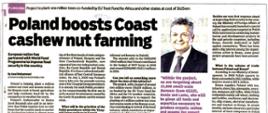Poland boosts Coast cashew nut farming - interview of the Ambassador for Kenyan newspaper "The Standard"
23.08.2020
Poland (and the other member countries of the Visegrad Group) is helping plant a million cashew nut trees and sesame seeds at the Kenyan coast to boost agriculture and help residents hard-hit by the coronavirus to weather the storm. Poland’s Ambassador to Kenya Jacek Bazański also said in an interview that Polish tourists love to visit Kenya but the country needs to market its destination better to attract more Polish citizens. Here is an excerpt of the interview he gave to "The Standard" newspaper.

Kenya is seeking various bilateral arrangements with the European Union post-Brexit, which comes at a time Poland is taking over the Visegrád Group presidency. Tell us about the group, members and why it was created.
The Visegrád Group (V4) was formed on February 15, 1991 at a meeting of the three heads of state and government of Poland, Hungary and the then Czechoslovak Republic, now separated into two independent countries, the Czech Republic and Slovak Republic. It is thus a cultural and political alliance of four Central European states. On July 1, 2020 was Poland’s turn to take over the annually rotating seat of the Visegrád Group presidency. It is already the sixth Polish presidency, but unquestionably the first one in such unusual circumstances caused by the Covid-19 pandemic and the related crisis.
What will be the priorities of the Polish presidency within the Visegrád Group and here in Kenya?
Each of the four countries has its own projects and initiatives aimed at improving the wellbeing of the Kenyan population. Poland, for example, has decided to further its cooperation with the World Food Programme, Kenya office, and for the third time in a row supplement its budget, this time with a voluntary contribution of 105,000 euros (Sh13.4 million) to help respond to growing food insecurity in Kenyan refugee camps and within the informal settlements in Nairobi.
The amount adds to the $400,000 (Sh43 million) that Poland contributed to the budget of WFP Kenya in 2018 and around $200,000 (Sh21.5 million) in 2019.
Can you tell us something more about the aims of this initiative?
The project, with a budget of around two million euros (Sh254 million), is co-funded by the EU Trust Fund for Africa and the V4 member countries. Its main objective is to support the planting of a million cashew nut trees and sesame seeds at the Kenyan coast, thus contributing to revival of the local industry, which constitutes an important branch of Kenyan agriculture.
We hope that this project will make farming a more attractive career option for young people and will facilitate job creation in agribusinesses across the region. Within the project, we are targeting about 15,000 small-scale farmers from Kilifi, Kwale and Lamu, who will be given all tools and expertise necessary to produce organic cashew and sesame for export.
Besides the mentioned contribution to WFP’s budget, are there any other Polish interventions in Kenya’s fight against coronavirus?
Kenya remains one of the priority countries for Polish Aid – Polish development assistance programme abroad, which gives us various opportunities for cooperation and support. Besides our very first response aimed at improving food security in the country, the Ministry of Foreign Affairs of Poland has recently launched a special call for applications targeted at Polish NGOs interested in conducting humanitarian and development projects in the said priority countries, including Kenya, directly dedicated to fight against coronavirus. There has been quite a big interest among the organisations active in Kenya, some great project proposals have been presented.
What is the volume of trade between Poland and Kenya?
According to our Ministry of Development, in 2019 Polish exports to Kenya amounted to $51.3 million, while imports stood at $31.1 million.
Kenya supplies Poland with tea, tobacco, dates, figs, pineapples, avocados, mangoes and coffee, while Polish companies mainly sell wheat, clothing and textiles, machinery and electronics, ship cranes, electrical transformers and tractors to Kenya. In recent months, we have observed a particular interest of local companies in Polish machines, software and advanced technologies that are subsequently used in Kenya’s industrialisation process.
Polish companies see increasing opportunities of investment in Kenya in the agri-food, construction and medical sector, especially telemedicine. Poland is also ready and willing to share its vast experience in modern and sustainable food processing with Kenyan partners.
By Awal Mohammed
The Standard
